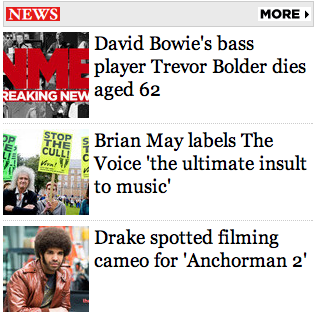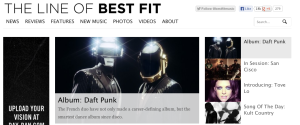Music journalism in the UK: More honest?London’s music scene is vibrant.
The record shops, the venues, the concerts, the artists – London has everything that any dedicated music fan could possibly want. Of course, to complement all of that, London has an incredible amount of music journalism. From major publications like New Music Express to growing blogs like Line of Best Fit, London’s music scene is thoroughly covered in print and online. All of this coverage brings me back to my United States questions. Are the publications in London biased toward certain artists, labels, or genres? How do the relationships between publicists and writers manifest? Are readers in the United Kingdom getting fair coverage of the music scene?
Looking for the best fit. To prepare for my upcoming interview with editor Paul Bridgewater of Line of Best Fit, I’ve been consuming as much of the music journalism here as possible. With every passing article I read, I try to find signs that a publicist contributed – and so far, it’s been much more difficult finding examples here. In the United States, it was easy to see how Pitchfork.com caters to their audience constantly. This trend has only continued; Pitchfork recently added three just-released albums to their regularly-updated ”Best New Music” list following constant coverage of those bands. In the United Kingdom, the hype is not so obvious. When Line of Best Fit covered American indie band the National, they still reviewed their new album with a balance of praise and criticism. Meanwhile, Pitchfork.com had featured electronic artist Daft Punk on its front page, and then named their album one of the “Best New Albums,” nearly overdoing the praise. Line of Best Fit was again more balanced in its coverage, still giving it praise but balancing the praise with a healthy dose of real criticism.
Coming up next… I’m excited to talk to Paul about these potential biases. I’m looking forward to talking with him about how he ensures his publication remains honest and transparent while catering to a ravenous group of fans. No such thing as bad publicity?So as you know, I am preparing to go to London. I’m excited to continue studying the music industry, especially exploring the role of publicity in this dynamic area. When I was in London last year, I focused on the differences in publicity between the United States and United Kingdom. I mostly researched what made a band or artist popular in one country and not another. Doing this comparison, I created four publicity tactics that would work in either country, and then included country-specific recommendations.
This year, as I said, I want to stick with analyzing publicity. However, I now want to focus on negative publicity in the music industry. I plan on understanding the relationship between music journalism and publicity, because music journalism needs artists and record labels to survive. I want to know if there is ever a conflict of interest, for example, if a band gets into trouble and a label wants that band to stay out of the press. Music journalism needs artists and labels to survive, almost more now than ever before. I plan to interview professionals in both music journalism and in record label publicity. I have already arranged an interview with Steve Knopper, a contributing editor for Rolling Stone and the author of Appetite for Self-Destruction. I think his experience writing for Rolling Stonewhile also doing research for his own book will make him a valuable resource in coming to an understanding of this topic. I am also currently talking to a former Spin editor about an interview in the same vein. I would like to interview a local journalist as well, just because I think that would add an important perspective. I am excited to begin this research. My first interview is today at 12:15, and I think that that will help me in creating a foundation for the rest of this project. Maybe we’ll finally know if there is no such thing as bad publicity! |
Author
|



